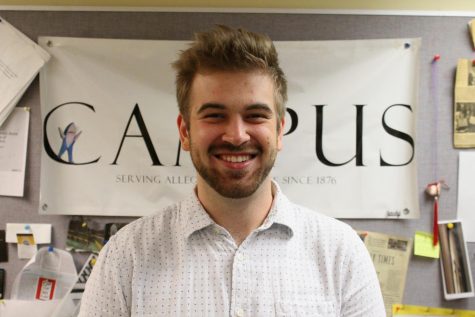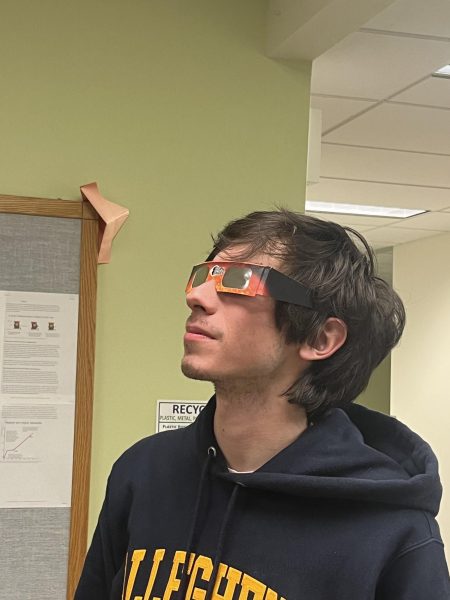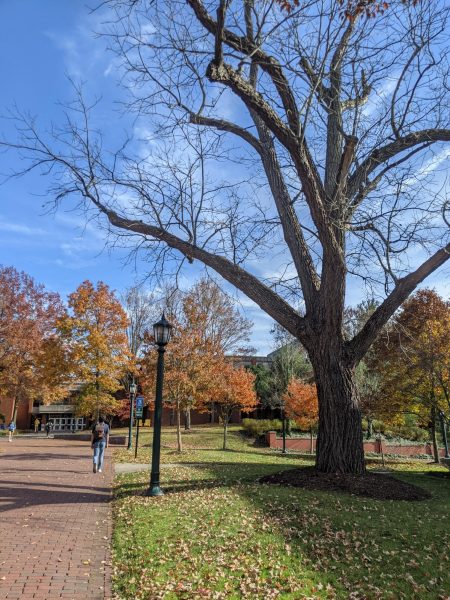Biology chair, students talk comp process and research
For many first-years arriving at Allegheny College, tales of the dreaded Senior Comprehensive Project are illusive and intimidating. A comp requires students to make use of all the knowledge and skills they acquired through their studies, and create and execute a professional project.
Biology is one of the most studied fields at Allegheny, with 10% of 2020 graduates opting for a major in the field, according to U.S. News’ Best Colleges Rankings. As first-years begin their career and groups of seniors begin their research and writing, the question weighs: what goes into a biology comp?
“Students will — from their junior seminar — have written a research project proposal,” said Associate Professor and Department Chair of Biology Bradley Hersh. “The first semester of the senior project in biology consists of rewriting and revising that proposal that they may already have written or developing a new proposal.”
Hersh explained that students changing their project after initially proposing it is not uncommon and about half of students end up switching in his estimation.
Emma Yesko, ’23, is one such student. Initially, she was testing the efficacies of different treatments for the fungal pathogen “Batrachochytrium dendrobatidis.”
“During summer research here, we stumbled upon a massive die-off of tadpoles,” Yesko said.
The topic piqued Yesko’s interest during her junior seminar with Associate Professor of Biology Matthew Venesky, themed around disease ecology. Venesky has since become Yesko’s comp adviser — a faculty overseer of the project who is familiar with the topic of study.
“(In the class,) we learned a lot about this from the pathogen that’s causing the die-offs too,” Yesko said. “When we saw it, we initially thought that could be the cause, but really, we’re thinking it’s a different virus, and that’s actually what I’m hoping to test for.”
Many of the best comps are those that the student feels prepared to explore and express actual interest in, even if they do not produce the most dynamic results, according to Hersh. Hersh primarily studies fruit flies, and his passion for his own work was obvious through all the fruit fly-themed paraphernalia around his office.
Hersh explained that he has advised interdepartmental projects in the past, fusing biology with fields from history to French. However, that usually takes a little more creative planning, as a biology comp requires a laboratory component. Hersh tries to push students completing dual comps to pose and answer questions like, “what are ways we can connect the social aspects or consequences of a particular field of study?” or “what are the ways that we could more effectively communicate the science?”
“What we’d like to see moving forward is a way to make it more regular,” Hersh said.
One of Hersh’s advisees, Emily Spitz, ’23, came upon her comp after a bout in the chemistry department. Spitz is a biochemistry major, which gave her the option to comp under the guidance of either the chemistry or biology department.
“I did some chem research initially for a couple semesters, but then I decided to take a biology junior seminar and really enjoyed it,” Spitz said.
Since biochemistry is its own department, Spitz did not have to deal with as many challenges as students comping across disciplines. She explained that while her focus is tied to the biology side of her research, she has to incorporate aspects of her chemistry studies.
“I’m focusing on mutating a gene that codes for part of a collagen protein, and seeing the effects that arise in my model organism from that mutation,” Spitz said.
Spitz was always interested in molecular biology and the interfacing of biology and chemistry, she explained, but it was not until after she began doing research with Associate Professor and Chair of Chemistry Phillip Persichini that she decided to start looking away from chemistry and toward biology.
“It ended up being a little bit more of an analytical project than a synthesis,” Spitz said. “I decided that wasn’t really the type of research I was the most interested in. Although it was fun and interesting, I decided I would rather do bio research because genetics has always been something that … piqued my interest.”
Both Spitz and Yesko hope to enter medical related fields after graduation; Spitz hopes to attend medical school, and Yesko wants to become a veterinarian for exotic animals.
Hersh explained that the biology comp is very advantageous to students pursuing masters or doctorates, as the proposals and research methods are very similar. At the same time, Hersh said those who enter the medical field also immensely benefit from the project.
“Often physicians are asked to interpret data or think about diagnoses of individual patients, (and) also what are the best ways to treat particular things,” Hersh said. “Being involved in the research experience and understanding the uncertainties … and complexities there, helps folks who are in the health field appreciate what goes into an understanding of a particular disease.”
No matter the research or career outcome of the individual students, Hersh is always excited to get together with the entire department at the end of the academic year for the Bio Senior Symposium.
“It’s like a scientific conference where all of the biology students are giving presentations, one after the other collectively,” Hersh said. “It’s a way to both disseminate the information about what the students are doing, but also to celebrate what they’ve been able to achieve. I think that’s a really nice community outcome of the senior bio comp.”

Roman Hladio is a senior from Wexford, Pennsylvania. He is studying English with a creative writing emphasis, and completing requirements for a Journalism...








